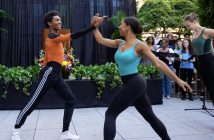Four Fordham professors talked about their experiences teaching in Jesuit institutions to a group of Lincoln Center students, faculty and the general public on Jan. 31 at the McMahon Hall student residence. The event, “Why Teach at a Jesuit Institution?” was part of the University’s annual Ignatian Awareness Week celebration.
Aristotle Papanikolaou, Ph.D., has experienced Fordham from both sides of the desk: he graduated from Fordham College at Rose Hill and now teaches in the Graduate School of Arts and Sciences and Fordham College Lincoln Center as an associate professor of theology. The son of Greek immigrants first talked about the openness of the religious and intellectual environment he experienced as a student.
“I came to Fordham not as a Catholic, but as a Greek Orthodox Christian,” said Papanikolaou. “I was touched by the immense enthusiasm and openness of my professors, especially among the Jesuits, toward my tradition.” He cited his experience with Thomas Birmingham, S.J., who spoke to him in Modern Greek.
Papanikolaou’s feeling of acceptance has continued as a teacher at Fordham, he said, citing the upcoming “Orthodoxy in America” lecture series as but one example. “I see this as an extension of the openness to other traditions,” he said. “At the same time, [the Jesuit tradition]asks you to critically examine your own tradition and religious questions in general. It’s not just finding answers, but finding the questions that are out there. One of the best things about a Jesuit education is the development of critical thinking,” said Papanikolaou.
Another faculty member from outside the Catholic faith tradition who said she’s felt the acceptance of the Fordham family is Hindy Bronstein, Ph.D., assistant professor of chemistry. Bronstein is an Orthodox Jew and advisor to the University’s Jewish student organization. “I can take off Jewish holidays, kosher food is provided at events…complete attention is paid to everyone’s way of life here,” she said. She lauded Campus Ministries for posting fliers for all religious events on campus and ensuring a spirit of tolerance in all groups that hold events.
“In chemistry, I teach about life’s creation, and I’m able to express a lot more about it and my beliefs here than I could at any other school,” said Bronstein. “I also love that students come and chat with me about their life, not just coursework.” Bronstein, who’s also taught at Boston College, said both Jesuit institutions had shown more concern for students than anywhere else she has been.
William Jaworski, Ph.D., associate professor of philosophy said, “I’m a Catholic scholar, a philosopher who is Catholic. I’m concerned with figuring out what’s true.” He said the Jesuits realize that growth in understanding God’s plan for the world comes gradually, and remarked that Jesuit spirituality encourages one “to go into the world and figure out the way God is working there.” He used the Biblical metaphor of salt of the Earth: salt gives flavor by getting “mixed into with things;” we spread the joy of living in faith the same way: in teaching, research, and community service.
“The openness at the heart of Jesuit identity is suffused throughout a Jesuit institution. That same openness is at the heart of good scholarship: it’s not afraid of finding out what’s true.”
Maureen O’Connell, Ph.D., assistant professor of theology—she, Jaworski and Bronstein all teach at Fordham College at Lincoln Center—said the encouragement and empowerment of the Jesuits made her the teacher she is today. She spoke of a commonality among Jesuit institution graduates; “we can all talk in the same language,” she said. O’Connell said she was happy to be “part of a living tradition which I can now shape,” a strong community sense she first noticed during her undergraduate years at St. Joseph’s University, Philadelphia’s Jesuit university founded just ten years after Fordham. (She later earned her doctorate at Boston College.)
As did Jaworski, O’Connell praised the Jesuits for giving students “a notion of what lies beyond the University, [and]helping folks beyond the margin.”
During the question-and-answer session, Papanikolaou said that there was a certain “Ignatian force” in place at Fordham over the past 20 years, and even though the presidency has changed, “a certain spirit pervades… there’s an incredible warmth that’s evident.”
By Brian Kluepfel


